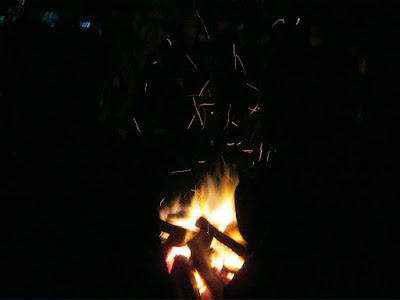Last weekend I attended the wonderful retreat for published writers and illustrators,
Kindling Words. I credit KW with saving my writing life back in 2006, when I was going through a case of the second book blues so severe that I wondered if I should give up this dream of being a writer after all and go get a "real" job, just like I'd done in my 20's and 30's because everyone said I should.
Kindling Words is a place where I go to rejuvenate, to be inspired, to learn craft, to commune with fellow creative souls. It's the perfect kick off for my writing year. This year I finished the revisions for my latest YA novel to send to my agent, while in the back of my brain the idea for a middle grade was percolating.

On the first night of KW, we always have an activity to get our creative juices flowing. Two years ago, it was a fantastic and fun African drum circle.
This year, we had an acting professor from Circle in the Square lead us in some exercises to get us in touch with ourselves and each other. I was a drama geek in high school, so I usually love this kind of stuff, but the minute he mentions "child exercise" I tensed.
The exercise was to find our "wonderful child." And I tried to do that, and I couldn't. And I ended up lying on the floor in the ballroom of a Vermont Inn sobbing. I told the professor that I don't have a Wonderful Child - but that I've worked very hard to be a Wonderful Grownup, and I like who I am now.
I have to apologize to Mary Lee Donovan, of Candlewick Press (Sorry Mary Lee!) because she had to do the next exercise with me, where we had to look into each other's eyes without speaking for many minutes, because the eyes are the windows of the soul. My eyes were all red and watery and I can't imagine looking into my soul at that point was a whole lot of fun.
The community at KW is so amazing. I had so many people come up to me afterward and tell me that I DO have a Wonderful Child. It made me want to cry all over again, but for a different reason.
The the next morning, I wrote this letter to my Wonderful Child, the one I couldn't find:
Dear Wonderful Child:
Last night I was sent on another mission to find you, and as usual, it ended in tears. I know you understand why I my already tense shoulder muscles went into spasm when I heard the words “child exercise” and acid production in my stomach went into overdrive, causing reflux my throat. You get it, because you were there. You know that when sexual abuse is perpetrated on a child so young they don’t even have the words to express what is happening to them, the post-traumatic stress effects last a lifetime, through drug use, a suicide attempt, bulimia, abusive relationships, and untold hours and too much money to want to think about worth of therapy. You might think that you’ve “dealt with it” but then all it takes is the student reaction to the story about a pedophile football coach in PA or hearing people making ignorant comments at Virtus workshop you have to attend in order to help out for your daughter’s musical theater production at the local Catholic church, or a guided exercise at a writing retreat and BAM! You’re right back in that place of horror and pain, the place where you’re a small, frightened child, scared in the darkness without a voice.
But the thing is, that’s not who you are now. Because you’re not a victim, you’re a survivor. You’ve worked hard. Even when all your bricks feel down and you had build them up again, one brick at a time, slowly and painfully, you never quit. And it’s paid off. Because now you do have a voice. That’s what finally , at age 38, allowing yourself to pursue your dream of being a writer gave you. And you use that voice in your political columns, to speak out when you see injustice, speaking for those who still might not have one. In your novels, you write for the kids like you, the ones who feel defective, like there’s something wrong with them that can never be cured, who feel like the wound that was inflicted on them, usually through no fault of their own, has left them too flawed and scared to ever find success, happiness and love.
You write because you want them to know that they’re wrong. You write because you want them to know that there’s hope. You promise to never lie to them, ever, because you know that denial is one of the most destructive weapons adults use on children. So you don’t pretend that the road will be easy, but you let them know that survival and, better yet, happiness, is possible.
You do that because in possibility lies hope. And hope will help them get through the hard times now, so they, too, can grow up to become adults they like better.
I might not be able to find my Wonderful Child in exercises like the one we did, but she's the voice within me when I write.


